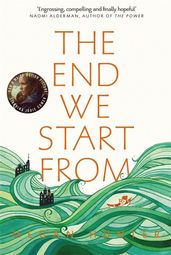Megan Hunter on The End We Start From
Megan Hunter shares the reasons behind the dystopian setting of her debut novel, The End We Start From, which is published in paperback, ebook and audiobook now.

Megan Hunter shares the reasons behind the dystopian setting of her debut novel, The End We Start From, which is published in paperback, ebook and audiobook now.
When I wrote The End We Start From, I was just leaving the enclosed, fragrant, greenhouse-like atmosphere of mothering babies and very young children. My first child was starting at school, my second at nursery. I was thinking a lot about the future, acutely aware of the passage of time, of the way things were changing.
As I remember it, I slipped from my own babyhood easily, barely noticing, propelling myself forward from one age to the next. My own children, as I was, are keen to put on years, to progress through the numbers from 1 to 2 to 3 to 4. Children may sometimes miss being babies, but it is the parent who carries the real weight of this progression, who experiences the acute revelation of the new version of their child every year, month or week. In early babyhood these changes are happening on a daily, if not hourly basis: life is all change, all future, and at the same time utterly lived in the present moment of every tiny shift, each new smile or gesture. It becomes hard to remember who the baby was last week or last month. When we see pictures or videos of them at an earlier age, we are shocked.
When I started writing my book, I was preoccupied with what happens when the future overcomes the present, when the parent is confronted with a force beyond their control. Our children’s growth is a microcosm of the growth of the world, of the way that things are constantly moving in a direction that feels out of our reach. Today, the ultimate embodiment of this is climate change, the fact that the very foundations of our life on earth are being altered, causing the weather to become extreme, ice to melt, seas to rise.
In The End We Start From, I set the global reality of climate disaster alongside the journey of a woman with a newborn baby, struggling to recover from birth. The usual insularity of this relationship is challenged continually: the earth’s future intervenes in the form of displacement, violence, and hardship. But in the foreground, the increments of the baby’s development continue. The narrator lives in a world of confusion, ignorance and uncertainty. Often, she has no idea what is happening in the ‘outside world’, her knowledge reduced to almost nonsensical scraps of information. She is shut off from everything she knew before, trying to care for her child.
Yet this is where she seems to learn something: in the most prosaic actions of changing a nappy, in observing a first attempt to crawl. Her gaze is necessarily meticulous, calculating, exact. She is not the conventional action hero of a disaster narrative, saving thousands of people. She can only do this: keep herself alive, keep her baby alive, keep going. The threat of what is happening around her often serves to sharpen rather than dull the quality of her attention, casting her experiences in the bright light of a threatened immediacy.
When we are failing to confront the global disaster of climate change on a daily basis, the days can themselves begin to seem meaningless, trivial. In the face of catastrophe, we can begin to wonder if anything matters except the urgency of the earth’s plight. Towards the middle of the book, the narrator wonders if ‘a baby is still something’, if staff in a hospital will still act to save a single infant in the midst of crisis. The End We Start From as a whole asks similar questions: what still has meaning in a ravaged world? What is the value of our humanity, if this is what we do to the world around us, and to each other? And to begin to offer some kind of reply, it looks here: at a helpless baby, reaching for his mother’s hand.
The End We Start From
by Megan Hunter
In the midst of a mysterious environmental crisis, as London is submerged below flood waters, a woman gives birth to her first child. Days later, the family are forced to leave their home in search of safety. As they move from place to place, shelter to shelter, their journey traces both fear and wonder as the baby's small fists grasp at the things he sees, as he grows and stretches, thriving and content against all the odds.
